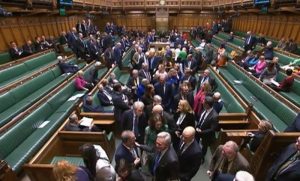The availability of drugs at one Surrey prison is a “critical threat to safety”, as inspectors said it had one of the highest positive test rates for illicit substances of all men’s prisons in England and Wales.
Inspectors pointed to 11 key concerns, highlighting four priority areas for HMP High Down in Banstead.
These were: too many acutely mentally unwell prisoners being held in the segregation unit; the availability and use of illicit drugs; increasing violence and prisoners feeling unsafe; and the prison not reaching its potential.
Charlie Taylor, chief inspector, said in his report that the drug situation in the prison “posed a threat to the stability of the prison, contributing to debt, bullying and fear”.
Other concerns raised included there being few incentives to behave well, high levels of self-harm, poor medicine supervision, long waits for dental treatment and not enough support being offered to “large number of prisoners with limited skills in English and maths”.
The prison was inspected in July and August, with a report published on November 13 saying the regime there was “nowhere near what it should be”.
With a positive drug testing rate among the highest in adult male prisons in England and Wales, Mr Taylor said the facility had had a “turbulent few years” in its delayed transition to a category C training and resettlement prison. He said “a real commitment” from leaders and the prison service was needed to make sure High Down completed its transition and that it was “not yet close to fulfilling its function as a category C prison”.
The prison, which was built on the site of a former mental health hospital and opened as a category A local prison in 1992, had 1,171 prisoners at the time of the inspection, and an operational capacity of 1,180 prisoners.
A survey carried out during the inspection showed fewer minority ethnic prisoners said staff treated them with respect, at 57 per cent compared with 77 per cent of white prisoners.
A Prison Service spokesperson said: “We have already taken decisive action to address the concerns raised in this report including bolstering our support for prisoners suffering from mental health issues.
“We are also strengthening the education and training on offer, including introducing a wider range of courses so offenders can gain the vital skills they need to turn their backs on crime.”
Availability of drugs ‘critical threat to safety’: In the survey 45 per cent of prisoners said it was easy to get hold of drugs, compared with 31 per cent at similar prisons.
In the three months leading up to the inspection, the positive drug test rate was “very high” at 33.73 per cent, and 21.08 per cent for psychoactive substances.
Inspectors said the widespread availability of drugs was causing high levels of prisoner debt and was “the main driver of violence which remained much too high”.
Despite having a proportion of positive drug tests among the highest of all men’s prisons in England and Wales, inspectors also said far too few tests were done on those suspected of using drugs. This meant users were not being discouraged, and inspectors said it was “disappointing” that reducing drugs coming in to the prison was not one of the prison’s priorities. Mr Taylor said: “The availability of drugs, in particular psychoactive substances, was a critical threat to safety.”
The report also pointed to steps being taken such as body scanners being used on those suspected of possessing drugs and joint working with police on the number of items entering the prison on drones and tackling staff corruption.
Prisoners spending ‘almost all day locked up’ in fear: Some prisoners spent “almost all day locked up” because they were afraid of bullying and violence, with some who had been assaulted by other prisoners and many in debt. Inspectors said: “Little was done to address the causes of their fear or to enable them to reintegrate with their peers.”
There were also concerns raised about officers not challenging poor behaviour and not supervising prisoners adequately.
Inspectors were told by staff told they saw “little point” in challenging poor behaviour because they lacked faith in the prison’s disciplinary procedures. The report said: “Too many prisoners felt unsafe. Safety was being undermined by violence and bullying, which were linked to drugs, very low wages, debt and a lack of full-time purposeful activity.”
A survey of prisoners also showed that 70 per cent of disabled prisoners felt unsafe at some point compared with 38 per cent of those without a disability. Inspectors also said: “There were still houseblocks where prisoners with a disability did not have an adequate personal emergency evacuation plan in place.”
As well as this, some prisoners being held in the segregation unit for an extended period were acutely mentally unwell, according to My Taylor’s report. There were also “chaotic scenes” seen by inspectors at medicine queues when officers did not supervise or control them well enough. Inspectors said this meant health care staff were “regularly distracted during the critical task of administering medicines, increasing the likelihood of error”.
‘Many prisoners did not have enough to do’: Inspectors said compared to other category C prisons, the regime at High Down “did not yet match” them, with a quarter of prisoners locked in their cells during the working day, described as “too many” in the report.
There were 200 unemployed prisoners and not enough activity places for those in the prison, which meant many prisoners did not have enough to do. The report said: “Many were limited to very basic and uninspiring work on the wing. Only for the few who were in full time work, was the prison offering an experience that was akin to employment in the community.”
Ofsted also inspected the provision at the prison, rating it inadequate overall.
A Storybook Dads programme, which helped prisoners record a story for their children to listen to at home, had been suspended due to a shortage of library staff. But Ofsted inspectors pointed to a monthly homework club where children could come into the prison to get help from their fathers as having “a relaxed atmosphere with both prisoners and their families enjoying themselves”.
What is done well at HMP High Down?
Inspectors said they saw “many positive and constructive interactions between staff and prisoners” including officers playing pool with inmates, despite poor behaviour not always being challenged.
Inspectors also said: “Prisoners on the drug-free living wing appreciated the respite from the high levels of drug use that took place elsewhere in the prison and here too support was provided by specialist staff. “There were also advanced plans to provide another more specialised unit for prisoners with personality disorders.”
The current prison governor has been in post since March 2022, and inspectors said: “If the governor and her team are to win over hearts and minds, they will need to increase significantly their visibility around the jail and improve the way they communicate with staff and prisoners.”
The report said governor Emily Martin had “developed a clear vision of how she wanted the prison to run and had begun to make progress”.
Related reports:
You could re-train to reform offenders
Image: HMP High Down from Google Maps











